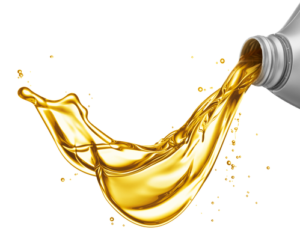The average car has a staggering 30,000 parts, and your car’s engine is ground zero for getting you from point A to point B. But did you ever stop to think why your engine works so much better with fresh oil?
A Well-lubricated Engine is a Happy Engine
 The truth is that when you slam down the accelerator and get that thrown backwards your engine is working overtime. Immediately your engine’s pistons and valves kick into high gear. That all produces a lot of heat. In fact, your engine probably works best around 200 degrees.
The truth is that when you slam down the accelerator and get that thrown backwards your engine is working overtime. Immediately your engine’s pistons and valves kick into high gear. That all produces a lot of heat. In fact, your engine probably works best around 200 degrees.
All that heat is necessary to get the job done since there’s so much power involved. That said, you need to have all of your engine’s moving parts lubricated with good oil so that things don’t boil over.
Your car will actually perform better and last longer by getting an oil change at regular intervals at All Around Auto Repair. You’ll significantly lower the chances of real trouble down the road and improve your fuel economy – thereby saving more money at the pump – by dropping your car off for an oil change every one in a while.
Throwing Sand in the Gears: Don’t Wait for an Oil Change
There’s even an expression that you’re going to “throw sand in the gears.” That really gets at what happens when your vehicle’s engine doesn’t have enough oil and lubrication – it overheats.
The reason your engine overheats when it doesn’t have enough oil is that, like having sand in the gears, your engine’s components create too much friction, overheat, and eventually suffer premature wear-and-tear damage.
So, when should you get an oil change? It really depends on how hard you drive your vehicle. With a lot of stop-and-go driving you might want to consider an oil change every 3,000 miles or so but with gentle driving about every 5,000 to 10,000 might be recommended. Check your owner’s manual.
Other factors that might require a more frequent oil change schedule include:
-Frequent short trips
-Lots of towing
-Operating in hot weather
Some people online talk about their unfortunate experiences going more than 10,000 miles without an oil change – iron, chromium, and aluminum wear corroding their engine is just the beginning of their troubles.
Game-changing Synthetic Oils are Awesome
Improved synthetic oils used today mean that you can probably go slightly longer than you could have decades ago. Don’t wait too long between an oil change, though, since dirt particles and sludge can have a corrosive effect on your engine over time and obliterate your fuel economy.
The synthetic oils used these days can go longer without wearing out, and they can more easily lubricate your entire engine and deal with hot temperatures to boot.
If you make a lot of short trips then regular motor oil might not get warm enough. When your oil doesn’t get to a certain temperature things don’t get hot enough to burn off impurities and deal with moisture. Newer oil blends can help you burn off more of the bad stuff where older, traditional oils would never get hot enough on shorter trips.
Getting synthetic oil at your next oil change with All Around Auto Repair might also be a good idea if you tow a lot of heavy stuff or have your car in summer heat.
Both of those things can lead to gunk and residue forming in your engine, which could lead to a clog and engine failure at some point. Newer synthetic blends are designed to reduce sludge buildup and clogs. Get the right blend by scheduling an oil change today.

